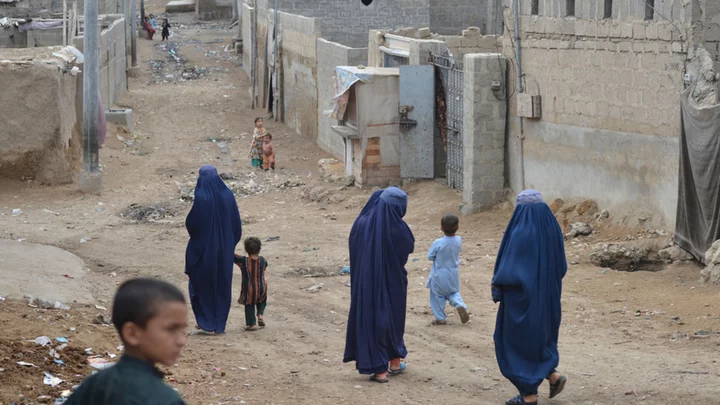
Afghans in UK visa limbo as Pakistan vows to expel migrants
Afghans who worked with the UK are living in fear in Pakistan as it cracks down on migrants without visas.
1970-01-01 08:00
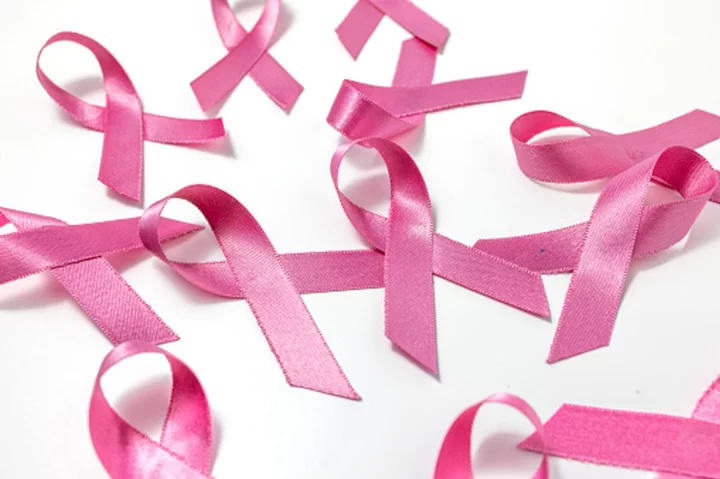
Why October is Breast Cancer Awareness Month - and why we wear pink ribbons
Although people typically associate the month of October with spooky season and the beginning of fall foliage, the month is also known as Breast Cancer Awareness Month. Breast Cancer Awareness Month dates back to 1985, when the American Cancer Society picked one week in October and teamed up with the pharmaceutical division of Imperial Chemical Industries – now part of AstraZeneca, which has worked to develop medicines for breast cancer treatment. The initial goal for the week-long event was to raise awareness towards breast cancer screenings and mammograms. First Lady Betty Ford was diagnosed with breast cancer when her husband, former US president Gerald Ford, was in office. As a breast cancer survivor, she initially helped bring attention to the disease during the week-long event. Over the years, the original week transformed into a month-long event. The goals for Breast Cancer Awareness Month have also evolved over time, such as supporting people diagnosed with breast cancer and metastatic breast cancer, educating people about breast cancer risk factors, stressing the importance of regular screening starting at age 40, and fundraising for breast cancer research. However, the well-known pink ribbon associated with Breast Cancer Awareness Month wasn’t introduced until the 1990s. The inspiration for the ribbon dates all the way back to 1979, when the wife of a hostage who had been taken in Iran tied yellow ribbons around the trees in her front yard as a symbol of her desire to see her husband return home safely. Ribbons were also used years later during the AIDS epidemic, when activists made bright red ribbons to represent those affected by AIDS. The AIDS ribbon was made mainstream after the 1991 Tony Awards, when actor Jeremy Irons was the first to publicly wear the pinned ribbon with a singular loop while hosting the awards show. A woman named Charlotte Haley is attributed with the creation of the Breast Cancer Awareness ribbon, as she was the granddaughter, sister, and mother of women who have all battled breast cancer. Initially, she designed the breast cancer ribbon to be peach-coloured instead of pink. With each ribbon, she passed out a card that read: “The National Cancer Institute annual budget is $1.8 billion, only five per cent goes for cancer prevention. Help us wake up our legislators and America by wearing this ribbon.” Because of her success in passing out thousands of ribbons, many corporations and news outlets reached out to Haley asking to showcase her ribbons and the message she was promoting. She declined each offer as she believed they were “too corporate”, but Self magazine was increasingly persistent. The magazine’s lawyer insisted they change the symbol’s colour, and the pink ribbon was born. In October 1992, the pink ribbon first spread across the nation after Estée Lauder displayed the symbol on its cosmetic counters throughout the country. While the iconic shade of pink is normally associated with Breast Cancer Awareness Month, other colours have been introduced, including hot pink for inflammatory breast cancer; teal and pink for hereditary and gynecologic cancers; pink and blue for male breast cancer; and teal, pink, and green for metastatic breast cancer. According to the American Cancer Society, breast cancer is the second most common cancer in women after skin cancer. There is a 13 per cent chance, or one in eight chance, that a woman will develop breast cancer at some point in her lifetime. Although breast cancer is more typically associated with women, it can also occur in men. In 2021, President Joe Biden designated 17 October to 23 October as Men’s Breast Cancer Awareness Week. While Friday the 13th may be a spooky-themed day, don’t forget that it’s also Metastatic Breast Cancer Awareness Day. Read More Elizabeth Hurley issues reminder to women about getting mammograms as she raises awareness about breast cancer Amy Dowden delights Strictly Come Dancing fans in surprise appearance amid breast cancer treatment Jill Biden urges women to get mammograms or other cancer exams during Breast Cancer Awareness Month Elizabeth Hurley issues reminder to women about getting mammograms Sharon and Ozzy Osbourne ‘plan to be euthanised’ if they lose mental abilities Billy Connolly says reports of his ‘demise have been greatly exaggerated’
1970-01-01 08:00
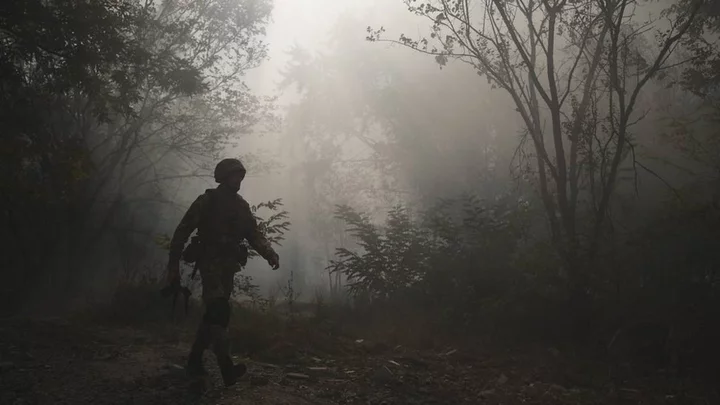
Ukraine war: Russia attacks Avdiivka stronghold in eastern Ukraine
Some 2,000 troops are reportedly involved in what is described as the largest-scale attack in the area.
1970-01-01 08:00
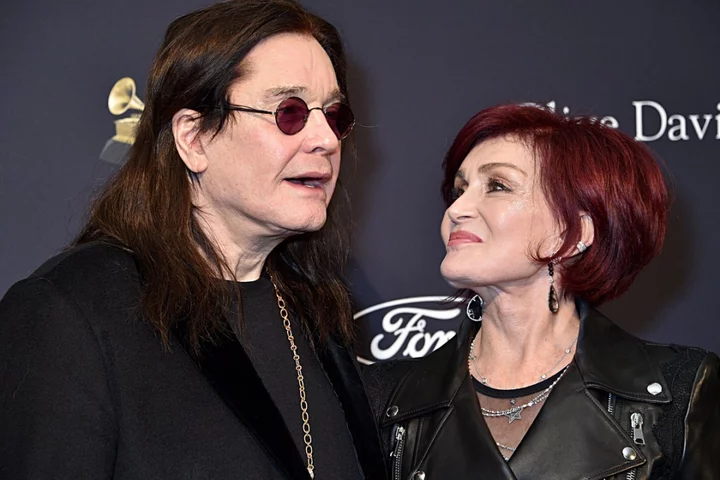
Sharon Osbourne says she and husband Ozzy plan to die by assisted suicide if their mental abilities decline
Sharon Osbourne has reminded her children of her and husband Ozzy Osbourne’s plan to die by assisted suicide, if their physical and mental health takes a severe decline. The former music manager and The Talk panellist, 71, initially discussed her end-of-life plans while promoting her 2007 memoir Survivor: My Story – The Next Chapter. In an interview at the time, Sharon said that she and Ozzy had come to the decision to visit a euthanasia facility in Switzerland, where the practice is legal. “Ozzy and I have absolutely come to the same decision,” she told the Mirror. “We believe 100 per cent in euthanasia so have drawn up plans to go to the assisted suicide flat in Switzerland if we ever have an illness that affects our brains. If Ozzy or I ever got Alzheimer’s, that’s it – we’d be off.” Sharon confirmed that their position on the matter hadn’t changed on the most recent episode of The Osbournes Podcast, hosted alongside Ozzy, 74, daughter Kelly, 38, and son Jack, 37. “Do you remember when Mum and Dad did that interview, talking about how they were gonna go and die through assisted suicide, and we were like ‘What the f*** is this?’” Kelly asked Jack. Jack replied: “They were like, ‘If we get terminally ill, we’re going to go to Switzerland and assisted suicide ourselves.’ Is that still the plan?” “Do you think that we’re gonna suffer?” Sharon asked, before laughing. To Jack’s proposal that “we [are] already all suffering”, she continued: “Yes, we all are, but I don’t want it to actually hurt, as well. “Mental suffering is enough pain without physical. So if you’ve got mental and physical, see ya.” She then clarified that if she had the chance to live longer while struggling with mental and physical issues, she’d decide against it. “What if you survived and you can’t wipe your own ass, you’re p***ing everywhere, s***ing, can’t eat,” Sharon said. “So, what’s different about your life [now]?” Kelly joked. Sharon’s strong view on having an assisted death is largely influenced by watching her father, music manager Don Arden, suffer from Alzheimer’s disease before his death in 2007. Then, in 2014, Ozzy spoke of his desire to die by medically assisted suicide in the case of any “life-threatening condition.” “If I can’t live my life the way I’m living it now – and I don’t mean financially – then that’s it...[Switzerland],” he told the Mirror. “If I can’t get up and go to the bathroom myself and I’ve got tubes up my ass and an enema in my throat, then I’ve said to Sharon, ‘Just turn the machine off.’ If I had a stroke and was paralyzed, I don’t want to be here. I’ve made a will and it’s all going to Sharon if I die before her, so ultimately it will all go to the kids.” If you are experiencing feelings of distress, or are struggling to cope, you can speak to the Samaritans, in confidence, on 116 123 (UK and ROI), email jo@samaritans.org, or visit the Samaritans website to find details of your nearest branch. If you are based in the USA, and you or someone you know needs mental health assistance right now, call the National Suicide Prevention Helpline on 1-800-273-TALK (8255). This is a free, confidential crisis hotline that is available to everyone 24 hours a day, seven days a week. If you are in another country, you can go to www.befrienders.org to find a helpline near you. Read More Inside the secret network of women naming and shaming their bad exes How to really tell if you’re Posh (or not) The rise of ‘Ozempic face’ and why it’s here to stay Billy Connolly says reports of his ‘demise have been greatly exaggerated’ How to get rid of bedbugs: Signs and symptoms amid threat of UK invasion Dawn O’Porter: ‘I fantasise about the other side of menopause’
1970-01-01 08:00
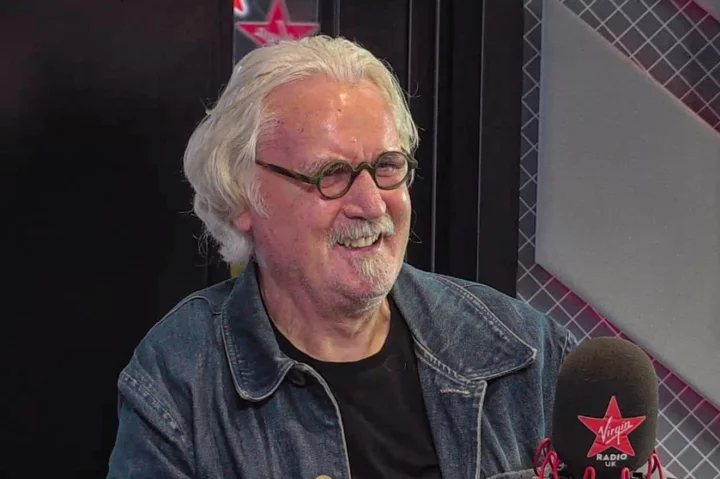
Billy Connolly says reports of his ‘demise have been greatly exaggerated’
Billy Connolly mocks misguided reports of his “demise” in an extract from his new autobiography. The Scottish actor and retired stand-up comedian, nicknamed “The Big Yin”, was diagnosed with Parkinson’s disease in 2013. Parkinson’s is a brain disorder that causes unintended or uncontrollable movements, such as shaking, stiffness, and difficulty with balance and coordination. Often, the disease can become more severe over time. During an interview published in September, it was revealed that Connolly had suffered “a couple of serious falls” and once broke his hip as a result of deteriorating balance. He also expressed having difficulties with walking. Despite these growing physical challenges, the What We Did on Our Holiday star clearly maintains a positive outlook about his health. In his new memoir, Rambling Man: Life on the Road, Connolly clarifies that he doesn’t feel “close to death”. “You see, reports of my recent demise have been greatly exaggerated,” he states in an extract shared with The Telegraph. “There was a week a few years ago where on Monday I got hearing aids, Tuesday I got pills for heartburn, and Wednesday I received news that I had prostate cancer and Parkinson’s disease. But despite all that, I never ever felt close to dying.” Connolly also writes about his feelings of comfort when in a cemetery, and how he reliably makes an effort to attend funerals. He recalls his manager being bewildered by his commitment, telling him: “Billy – even if you haven’t seen someone for 25 years and they die in another country you’ll jump on a plane.” “I just like to see people off,” the comic explains. “It’s important to me. Boys from school. Apprentices from the Clyde. Welders. It’s a bit like a school reunion. Seeing all the people from that place and time – that world I was once part of.” Five years after his diagnosis, Connolly retired from his stand-up career due to the increasing difficulties of the illness, and has previously offered insight into the realities of living with Parkinson’s. Though he said he does not feel close to dying yet, he has spoken with his wife, psychologist Pamela Stephenson Connolly, about the message he’d like on his gravestone when the time comes. He wrote: “I was thinking I’d like: ‘Jesus Christ, is that the time already?’ on mine, but my wife Pamela was shaky about it, so we settled on ‘You’re standing on my balls!’ in tiny wee writing.” Rambling Man: Life on the Road is out now. Read More Billy Connolly says ‘cruel’ Parkinson’s disease has made it difficult to walk Sir Billy Connolly unveils four new drawings for sale Prince William reveals he can’t handle overly spicy food or he’ll ‘start sweating’ Billy Connolly says ‘cruel’ Parkinson’s disease has made it difficult to walk How to get rid of bedbugs: Signs and symptoms amid threat of UK invasion Dawn O’Porter: ‘I fantasise about the other side of menopause’
1970-01-01 08:00
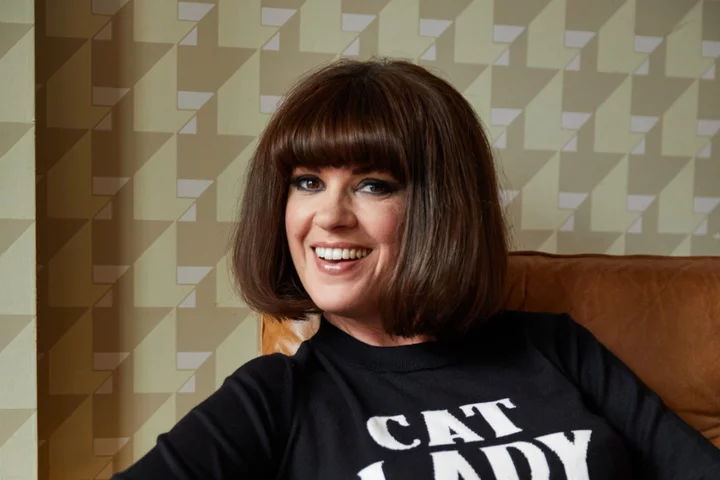
Dawn O’Porter: ‘I fantasise about the other side of menopause’
Knowing her limits is a “revelation”, says Dawn O’Porter, something she discovered in her mid-40s. For the former TV presenter and author – her latest book, Cat Lady, which was released in October last year – it’s something she’s had to learn. “I love drinking booze and eating really indulgent food, but I’m also really into health stuff as well,” she says. “I’m one of those people that’s really good – if I go to a party and it gets to 10:30pm [and] I’m not really feeling the booze, I just stop drinking – but I can stay out until two in the morning. I’m able to turn it off, and I don’t overindulge when I’m done – which I think is a real mid-40s revelation. “I know my limits – I go to everything, I do everything, I just stop when I know I’m done.” For O’Porter, 44, who shares two sons, Art, eight, and Valentine, six, with actor husband Chris O’Dowd, becoming a mother helped shift her perspective. “Since I’ve had kids, I know that I’m going to get woken up at six o’clock in the morning – you’ve got to make better decisions,” she says. “Like everybody, if I don’t do the work, I don’t get paid – and I don’t have the luxury where I can’t get paid. I have to be at my desk at 10 o’clock in the morning, and before I’ve got to my desk I’ve had to feed two humans, get them dressed, get them to school, walk two dogs, pull the house together and do all this stuff. “I know now that when I go on a big night out – which I do all the time, I love it – the next day is a write-off, so I can only do that once a week. It used to be three or four times a week, and it didn’t affect me in the same way. “I definitely feel like it’s a great thing to get to an age when you know what you can and can’t handle.” This “willpower” is something she admits she “didn’t used to have”. But dedicating time to her wellbeing is important, as being in your 40s is a “weird time”, she admits. “You know what’s coming – menopause is coming. What are we in for? So I feel like I’m going to do my very best for myself until that happens. It might be fine, it might not – I don’t know.” O’Porter adds: “It feels nice to go into it in the best health you can be. I’m not an exercise person – I get really into Pilates for two months and never do it again – so I’m consistent about healthy food and skincare and all that kind of stuff.” She’s reminded of a speech Kristin Scott Thomas makes about menopause in the BBC black comedy Fleabag, where she says: “It is horrendous, but then it’s magnificent – something to look forward to.” O’Porter adds: “As someone who has had cramps and really suffered for so much of my life, I fantasise about the other side of menopause – it’s like this giant mountain you have to get over. “I might smooth through it and not even know it’s happening, or I might be one of those people who has a very difficult time – I’ve got no idea. I just want to feel good when I go into it. “I do feel like there’s this freedom on the other side – I’ll be rid of all the things that have weighed me down physically for so many years, and be pain-free and happy.” A healthy diet is particularly important for O’Porter, who can’t eat gluten because it causes her “quite severe pain”. She says: “I have to think about food a lot more than people who can eat gluten – I really read packages and all that stuff. And I’m obsessed with my skin – I really try and eat food that’s really, really good for my skin.” Other aspects of her self-care routine include taking supplements (“If somebody says it stimulates collagen, I’ll literally buy 10 of it!”), taking Epsom salt baths and carving out the time to read before bed. “I think that’s really looking after myself, [so] when I have nights where I’m completely hedonistic and start drinking at 10 o’clock in the morning and don’t get home until four, that’s fine. Because I take care of myself the rest of the time, I think my face survives the hangovers and the dehydration.” After 15 years living in America, in June this year, O’Porter and her family moved from Los Angeles to London – and she couldn’t be happier to be back. “There’s quite a transient vibe to LA, because very few people are born and bred there – there are some, obviously, but most people have come out for some sort of work experience they’re having. They either stay or go, and there’s this constant movement of people. “It was hard to imagine getting older there and settling, there was always this feeling of no matter who we’ve got in our lives, they will come and go – and that unsettled me in the last few years.” Back in London, “Everything I do is an investment in the future of living here, which feels really lovely,” O’Porter enthuses. “Every relationship I make – all my girlfriends or my mum friends – everybody is here for keeps.” She’s particularly looking forward to spending Christmas on this side of the world. “I started planning Christmas months ago – where we’re going to be, what we’re going to do, because ultimately, I love hosting it. I love doing the whole thing myself.” She’s hoping to host this year, and foresees absolutely no festive pressures, saying: “It doesn’t stress me out at all, I’d say it’s me at my absolute best. “I cook like Christmas Day on every Sunday for lots of people, I love it so much. I get really into it and I start drinking about 10 in the morning – it makes it more fun – we play Christmas songs and get the wine going early and cook all day.” Plus O’Porter – who is offering shopping consultations in collaboration with Etsy ahead of Christmas – is extremely easy to buy for. “I’m really easy. I genuinely say this from the bottom of my heart – go on Etsy and put in ‘cat’ and you can get me anything, any handmade anything – if it’s got my name on it, even better, with a cat on it. I am so simple.” To find thoughtful gifts for loved ones this Christmas and beyond, head to etsy.com/uk. Read More Everything you need to know about bedbugs as increase in numbers is predicted PE ‘enjoyment gap’ widens for girls: Why it matters and how we can help The psychology of Big Brother: How to survive in the house How to support someone coming out in their 30s and beyond Israel-Hamas conflict: How to talk to teenagers about distressing news stories Autumn décor ideas for a seasonal refresh
1970-01-01 08:00

US to attend Beijing defense forum in latest sign of improving ties
By Michael Martina and Idrees Ali WASHINGTON The U.S. says it has accepted an invitation to attend China's
1970-01-01 08:00

King Charles to acknowledge 'painful' Kenya history on state visit
The state visit will come on the 60th anniversary of the country's independence from the UK.
1970-01-01 08:00
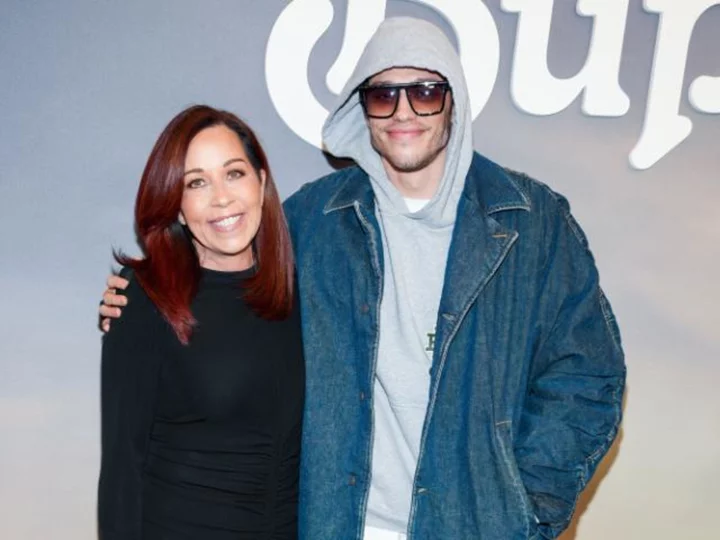
Pete Davidson wants to find a date for his mom
Pete Davidson says his mom is a "good catch," so he wants to help her find a boyfriend.
1970-01-01 08:00
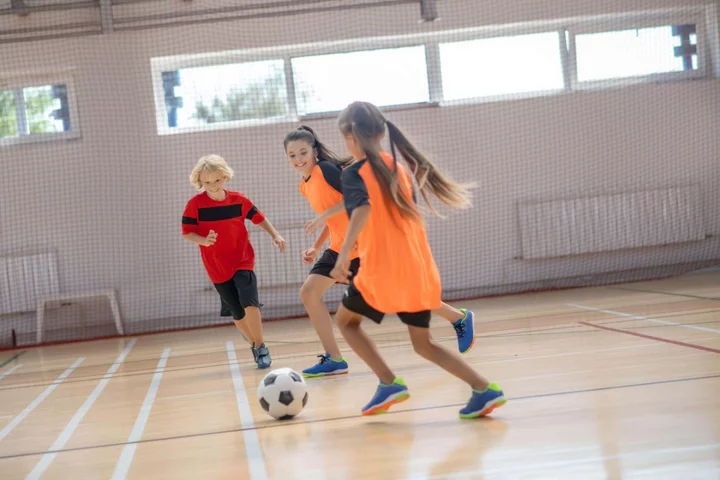
PE ‘enjoyment gap’ widens for girls: Why it matters and how we can help
The number of girls who say they enjoy school PE lessons has dropped over the last six years, new figures suggest. Less than two in three (64%) female pupils said they liked taking part in PE, compared with 86% of boys, according to the survey by the Youth Sport Trust charity – a drop from 74% of girls in 2016/17. The PE ‘enjoyment gap’ was even bigger for secondary school students – just 59% of girls in this age range said they enjoy PE. Nearly 25,000 pupils in England aged seven to 18 were polled by the charity. And 64% of the female respondents said they want to be more active at school but there are barriers getting in their way – including not feeling confident, having their period, being watched by others and worrying about how they look. Ali Oliver, chief executive of the Youth Sport Trust, said: “We must be absolutely committed to understanding the experiences of young women and girls, how these are constantly changing in a complicated world, and be better at working with them to address the barriers they face. “At a time of unprecedented low levels of social and emotional wellbeing, we know getting things right for girls in PE can be life-changing.” Listening to girls’ concerns It’s a topic that strikes a chord with many experts from this field. “It is so important to listen to girls’ concerns when it comes to the barriers they are experiencing, because we know these barriers are something that can stay with them throughout adolescence and into adulthood,” Vicky Fitzgerald, health improvement lead at health and wellbeing charity Nuffield Health, told the PA news agency. “Research has suggested that women in particular face more barriers to fitness than men, citing impacts such as a lack of time, motivation and knowledge, as well as caregiving responsibilities. By addressing these concerns from a young age, we are then able to support where needed, identify solutions, or provide alternatives to reignite engagement.” Wider benefits As the Youth Sport Trust highlights, the benefits of sports and PE are far-reaching. Charlotte Fray, rugby player with Leicester Tigers Women and a sports coach at Leicester Grammar School, agreed: “Sport is massive for confidence and forming lasting friendships. For young girls especially, if they enjoy what they’re doing they are going to have more confidence. “It’s a great way to remove any stressors from their life and have time to switch off, whilst discovering a love for sports.” Alex Caird, school games organiser at charitable trust, SASP (the Somerset Activity & Sport Partnership), added: “School sport is an incredibly valuable tool to teach life skills that are transferable from classroom to sporting environments and back again, and it is fundamental that these opportunities are tailored to the young people we aim to impact.” Shifting mindsets Caird believes making accessibility part of the culture of PE and sports lessons plays an important part. “At SASP, we not only empower more students to get involved and feel confident, but also school staff to see the difference physical activity makes to their own teaching confidence, to try new things and seek out further opportunities for their students to flourish and grow,” Caird explained. “We’re determined to use sport as a vehicle to drive this healthier lifestyle change, as well as build physical activity into a healthy school culture that sees the benefits of holistic experiences for all young people in any activity, not just the ‘traditional’ sporting calendar setup.” Education around women’s health also needs to be a priority... Fitzgerald meanwhile added: “Education around women’s health also needs to be a priority. An understanding of menstrual cycles and how they impact young girls, confidence/self-esteem concerns, questions around skills or ability – having an understanding of how all of these impacts can affect an individual removes the pressure or fear of them having to explain it.” The power of role models Dr Jackie Day-Garner, associate dean of the School of Health, Social Work and Sport at University of Central Lancashire, believes setting positive examples is key. “An active mother, parent, or teacher in the early years can help to influence positive behaviours around physical activity. And role models such as social media influencers or female athletes could help teenage girls to engage more in sport,” she said. “We’ve already seen the increase in the visibility of female sport on television, with England netballers contesting a World Cup final and the Lionesses winning the Euros and becoming finalists in the World Cup. We’ve also seen prolific sports women wanting to empower girls to play sport. For example, Leah Williamson speaking at the UN assembly about the topic.” While Fray believes having “different kinds of role models” helps inspire girls to find activities they’ll enjoy. “Rugby is great for this, as there is so many different shapes and sizes within the game, that everyone can find a role model. Girls can realise they don’t have to fit a certain category to play sport. There are so many different sports out there,” she added. Widening the options Fitzgerald believes we also need to show girls from a young age that there are lots of different ways to be active. “If PE isn’t enjoyable, try to find an alternative which introduces exercise in a less-pressured environment. Programmes such as Nuffield Health’s Move Together is an example,” she said. “These free classes are specifically designed as a solution for the barriers that young girls have cited. “They are available in local communities and offer a multitude of classes, from Zumba to HIIT, strength training, cardio classes and more, to inspire young girls to find a type of movement they enjoy.” The choice of activities available in high schools is also important, added Day-Garner. “There has been too much emphasis on organised sport. It might be more appropriate to look at what activities girls are likely to engage with when they leave school, as women often a re-engage with exercise in their early 30s.They might join a gym or leisure centre, or participate in classes such as Zumba.” Read More The psychology of Big Brother: How to survive in the house How to support someone coming out in their 30s and beyond Israel-Hamas conflict: How to talk to teenagers about distressing news stories Autumn décor ideas for a seasonal refresh Why you shouldn’t tidy your garden too much in autumn World Mental Health Day: 5 ways to beat anxiety and change your life
1970-01-01 08:00

Steve Rider tells men to ‘recognise your vulnerability’ after prostate cancer diagnosis
Sports commentator Steve Rider has shared a message encouraging men to be conscious of their health after his prostate cancer diagnosis. Rider, 73, was told he had the disease last month after a biopsy. The former Grandstand and Sportsnight presenter will undergo surgery to treat it this weekend. Ahead of the operation, Rider shared some insight into his journey to diagnosis, which began when a friend was diagnosed during a routine health check. “He had a scan which showed some alarming things going on with the prostate and within a month he had the full operation and that woke everybody up because he had no symptoms and very fit guy, and roughly our age,” Rider told the PA news agency. After initially testing, Rider’s readings for cancer were “not that high”, so he’d planned not to take further action. His wife, Jane, urged him to have further tests, and a biopsy was taken. He continued: “I thought the worst that can happen is that I’m going to be monitored for the next six months or so and we got the results of the biopsy the next day and they said, ‘No, you come in as soon as you can, we’re going to operate.’” Rider said his diagnosis was aided by his friends having open conversations and his wife encouraging him to get further tested. “We do tend to treat these things a little bit like getting your eyes tested or ears done, you can put it off and maybe think ‘Well, I’ll wait till the symptoms come’. “Symptoms don’t come and when they do, it is probably too late.” He added: “The message is to recognise your vulnerability, especially with age and family history and so on. And if you do feel that you fall into those categories, then get yourself checked.” According to the charity Prostate Cancer UK, 144 men are diagnosed across the country each day – more than 52,000 per year. Rider’s former BBC colleague Bill Turnbull died in August 2022, nearly five years after being diagnosed. After sharing his diagnosis publicly in March 2018, Turnbull detailed his treatment in a Channel 4 documentary called Staying Alive. Speaking about the late broadcaster, Rider said: “The great thing about Bill was that he wanted to turn his misfortune into an information campaign which would save hundreds of others and I’m sure that probably hundreds and thousands of men have stepped back from a really serious cancer because of the attention that Bill Turnbull brought to early diagnosis and testing. “And apart from that, he was a lovely, lovely guy.” Rider found out that he had cancer the day after taking part in sports presenter Jeff Stelling’s charity Football March in Turnbull’s honour. Prostate Cancer UK has said the disease affects one in eight men in the UK and that more than 12,000 men die every year from the condition. They advise that if a man is over the age of 50, Black, or has a family history of prostate cancer that he may want to speak to a GP as these are higher risk factors. To find out more about your prostate cancer risk, or that of your partner, father or friend, you can visit Prostate Cancer UK’s website – prostatecanceruk.org/risk-checker – and try the 30-second online risk checker. Additional reporting by PA Read More Cancer cases in young people ‘are rising’ – the warning signs to look out for Jeff Stelling leads hundreds to complete Wembley to Wycombe walk in honour of Bill Turnbull Duran Duran’s Andy Taylor claims he was ‘visited by angel’ after starting new cancer treatment The psychology of Big Brother: How to survive in the house Sports culture is ‘intimidating’ and putting people off working out Israel-Hamas conflict: How to talk to teenagers about distressing news stories
1970-01-01 08:00

The psychology of Big Brother: How to survive in the house
Big Brother has returned to British TV for the first time in five years. Hosted by AJ Odudu and Will Best, the ITV reality show has kicked off with 16 housemates living together in a custom-built home without access to the outside world – all in a bid to win £100,000. Since Big Brother first aired on Channel 4 in 2000, it’s become known as the ultimate social experiment. Here are a few tips from psychologists on how the new contestants can survive being cooped up in a house with a group of strangers, under the continuous monitoring of Big Brother… The psychology of Big Brother For Dr Rachael Molitor, a psychologist and lecturer at Coventry University, the psychology behind Big Brother involves “the intricate interplay of 24/7 surveillance on human behaviour, participant isolation from the outside world, and psychological challenges around newly formed and integral social friendships and group dynamics”. Although it may be deemed similar to other TV programmes, such as Love Island or The Traitors, where contestants also live together in a new home, Big Brother is different. “It has a unique stance, in that the contestants are not a cookie cutter of a particular type of person needed for the show’s storyline,” Molitor said. “With Love Island and My Mum Your Dad, the contestants needed to be single and of a certain age or criteria. With Big Brother, we can see a number of varying contestants, all with different backgrounds and personalities.” However, Molitor notes that Big Brother is “less of a psychological observational experiment” and “more of a TV entertainment viewing opportunity – and edited as such”. She said: “The environment provides a rich opportunity for the study of human behaviour, social dynamics, and the psychological effects of living in a controlled, highly competitive and monitored setting.” How can contestants survive in the Big Brother house? For Molitor, the key to survival is for contestants to be themselves. “Due to the length of time contestants will be on the show, it’s important to build strong genuine relationships. Effective communication supports the positive experience of all housemates,” Molitor added. Dr Sarita Robinson, associate dean of psychology and humanities at the University of Central Lancashire (UCLan) agrees, and said: “Like with any group of people in an enclosed space, inter-group conflict is likely to occur. “Rather than reacting immediately to something that has annoyed you, it is best to walk away and wait for 15 minutes. It’s amazing how a little bit of time can take the heat out of a situation for the contestants.” How can they protect their mental health? Taking care of your mental health isn’t always the easiest thing to do on a reality TV show, Robinson suggested. “Due to social evaluative stress that relates to what people think of us, this can have a marked impact on our physiological stress levels if we think people are making negative judgements about us.” But things have changed since the show first aired. “With the new care of duty plan, contestants can ask for help when needed and get mental health and wellbeing support prior to, during and after the show has ended,” Molitor said. Whilst in the house, there are a few “small health-enhancing behaviours” contestants can do. These include “getting enough sleep, exercise and healthy eating to support their health and wellbeing throughout”, Molitor advised. Robinson also warned against behaviours that might impact your state of mind. “If people start to stress their brains by drinking alcohol, having poor quality sleep, restricting their food intake or changing their normal use of things like nicotine, caffeine or medication like antidepressants, it can have an impact on the brain,” Robinson said. “For example, if you don’t get a good night’s sleep your brain will struggle to work as well as it usually does, which can cause problems with emotion regulation. The knock-on effect of this might make you more likely to be grumpy and have a row with someone.” Big Brother airs nightly on ITV2 and ITVX, excluding Saturdays. Read More How to support someone coming out in their 30s and beyond Israel-Hamas conflict: How to talk to teenagers about distressing news stories Autumn décor ideas for a seasonal refresh Why you shouldn’t tidy your garden too much in autumn World Mental Health Day: 5 ways to beat anxiety and change your life Alternative veg to grow for next season
1970-01-01 08:00
